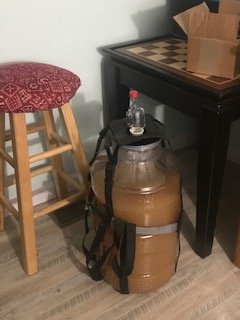I am going to try my hand at making 5gal of applejack moonshine for the first time next week. Being new at this, I watched a youtube video about how to make it. In the video, the guy gave a warning that drinking too much applejack will cause one of those "I wanta kill myself" hangovers because it contains methanol which is basically a poison. But I couldn't help but question why. When you distill liquor, you always toss out the heads which is the first pint or so of distillate because it is mostly methanol which boils off at a lower temperature (roughly 149 F) than the ethanol which has a boiling point of around 173 F.
So, what's stopping me from taking the fermented cider and heating it to say, 165 F for awhile until the methanol boils off and then freeze it to get the water out. Am I missing something?? The other question is, how long would I have to keep the cider at 165ish to ensure all the methanol is gone?
Thanks
So, what's stopping me from taking the fermented cider and heating it to say, 165 F for awhile until the methanol boils off and then freeze it to get the water out. Am I missing something?? The other question is, how long would I have to keep the cider at 165ish to ensure all the methanol is gone?
Thanks







































![Craft A Brew - Safale S-04 Dry Yeast - Fermentis - English Ale Dry Yeast - For English and American Ales and Hard Apple Ciders - Ingredients for Home Brewing - Beer Making Supplies - [1 Pack]](https://m.media-amazon.com/images/I/41fVGNh6JfL._SL500_.jpg)




















